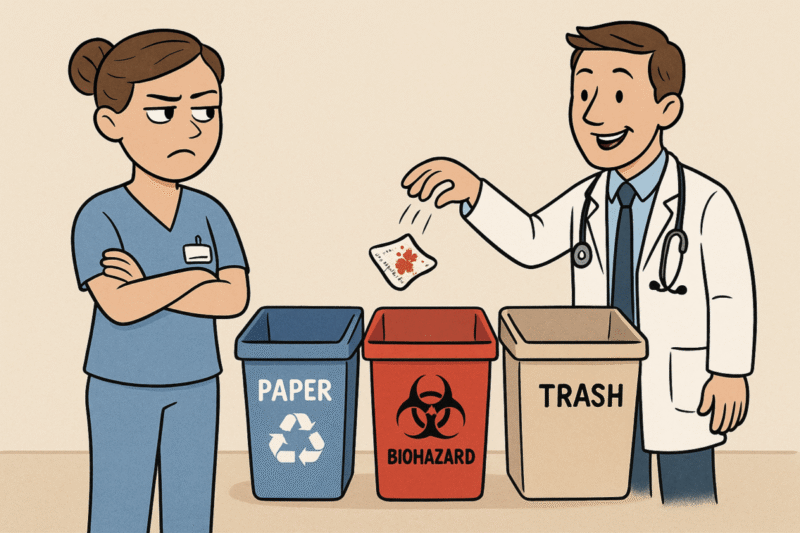The 3 a.m. Nursing Career Crisis
At some point in every nurse’s career—usually around 3 a.m., when you’re staring at a blinking IV pump while wondering if caffeine counts as a food group—the thought creeps in:
“Should I advance my nursing career?”
You’ve survived:
- Nursing school struggles (flashbacks to pharmacology exams still haunt you).
- The NCLEX, aka the Hunger Games of standardized testing.
- Countless shifts that included bodily fluids, emotional trauma, and enough caffeine to rival a Starbucks barista.
Now you’re asking yourself:
- Should I enroll in an RN to BSN program?
- Should I become a nurse practitioner and finally write orders instead of chasing them?
- Should I chase the legendary CRNA salary that makes Sallie Mae payments slightly less painful?
- Or should I stay right here, with my trusty badge reel collection and the comfort of knowing my manager already owes me three favors?
This guide is here to help you weigh the pros, cons, and comedic truths of climbing the nursing ladder while sprinkling in career insights to help you make the decision that’s right for you.
The RN Life: Comfortable Chaos
Being an RN isn’t easy, but it has its perks (and pitfalls).
Pros of Staying an RN
- Flexibility in Career Options: Hospitals, clinics, schools, home health, telehealth, or travel nursing—RNs are in demand everywhere.
- Steady Pay: Not quite CRNA salary levels, but enough for bills, rent, and an occasional Target splurge you don’t remember justifying.
- No More Exams (for now): You conquered the NCLEX. Why willingly go back to APA format citations and group projects?
- Built-In Respect: “RN” behind your name already carries instant credibility. Patients (usually) trust you, and doctors (sometimes) respect you.
Cons of Staying an RN
- Burnout Risk: Staffing shortages and double shifts mean little time for recovery. Nurse burnout prevention becomes a daily priority.
- Career Ceiling: Many hospitals now require a BSN for promotions or Magnet status. Without it, leadership opportunities may be limited.
- Limited Autonomy: No matter how experienced, some decisions always need provider approval.
- Manager Pressure: That one boss who says, “Have you thought about grad school?” right after you barely survived a code blue.
Why Nurses Consider Career Advancement
Let’s be real: career advancement usually crosses your mind when you’re knee-deep in charting and call lights at 4 a.m.
Funny (But Real) Reasons Nurses Dream of Going Back to School
- The Paycheck Fantasy
You picture NP or CRNA paychecks screaming, “Goodbye ramen noodles, hello vacations.” - Bedside Burnout
You dream of not being interrupted during lunch… until you realize NPs get interrupted for prescription refills instead. - Social Media Envy
You see nurse influencers in spotless scrubs sipping $7 lattes. NP school looks glamorous on Instagram. Reality = APA citations and sleepless nights. - Sleep-Deprived Decisions
After 27 hours awake, signing up for grad school sounds like a fantastic idea. Spoiler: it’s not just sleep talking.
Real Pros of Advancing Your Nursing Career
- Higher Pay Potential: CRNAs lead the charts, with NPs, educators, and managers not far behind.
- Greater Autonomy: Order tests, prescribe meds, lead care plans.
- Career Satisfaction: Many thrive in leadership, advanced practice, or teaching roles.
- Job Security: The demand for advanced practice providers and nurse educators continues to grow.
Real Cons of Advancing Your Nursing Career
- Student Loan Debt: Congratulations—you just married Sallie Mae.
- Academic Stress: It’s Nursing School 2.0, complete with sleepless nights and APA nightmares.
- Increased Liability: Autonomy comes with more charting and higher malpractice risks.
- Time Commitment: Nights, weekends, and your Netflix binges? Gone.
Comparison: RN vs. BSN vs. NP vs. CRNA vs. Nurse Educator
| Path | Education Needed | Average Salary (US) | Pros | Cons |
|---|---|---|---|---|
| RN (ADN/ASN) | 2 years | $70k–$80k | Flexible entry, faster to workforce, stable | Ceiling on advancement |
| BSN (RN to BSN) | +1–2 years | $75k–$85k | Opens leadership roles, Magnet hospitals | Tuition costs, extra coursework |
| Nurse Practitioner (NP) | MSN (2–4 years) | $110k–$130k | Autonomy, higher pay, prescribing authority | Student loans, more liability |
| CRNA | MSN/DNP (3+ yrs) | $180k–$200k+ | Top salary, specialized role, independence | Stress, intense schooling |
| Nurse Educator | MSN (2 years) | $80k–$100k | Influence future nurses, academic stability | Lower pay than NP/CRNA |
Common Questions Nurses Google (And Honest Answers)
Should Nurses Go Back to School?
If your goals include leadership, advanced practice, or teaching, yes. If you’re debt-averse and happy, staying RN is perfectly respectable.
Is RN to BSN Worth It?
Absolutely—especially for travel nurses, Magnet hospitals, or leadership promotions. Many programs are affordable and online.
Should I Become a Nurse Practitioner?
Pros: autonomy, pay raise, high demand. Cons: liability, student loans, charting overload.
Is Becoming a CRNA Worth It?
If you want top pay and thrive under pressure, yes. But schooling is competitive and stressful.
What About Nurse Educator Careers?
If you love teaching, mentoring, and shaping the next generation of nurses, becoming a nurse educator provides stability and impact.
Funny Signs You’re Ready (or Not) for More School
- Ready: You get excited about new highlighters and color-coded binders.
- Not Ready: You cry when someone mentions APA format.
- Ready: You’re Googling “cheap coffee subscriptions” at 2 a.m.
- Not Ready: You still twitch when you hear pathophysiology exam.
How to Decide If You Should Advance Your Career
- Define Your Goals: Do you want leadership, autonomy, or higher pay?
- Run the Numbers: Will your salary justify the tuition and loans?
- Shadow the Role: Spend time with an NP, CRNA, or nurse educator to see if you’d enjoy it.
- Listen to Your Body: If bedside nursing is taking a toll, advancing may open less physically demanding paths.
Final Thoughts
The question “Should I advance my nursing career?” has no one-size-fits-all answer. If you want autonomy, higher pay, or professional growth, advancing your career makes sense. If you’re content, debt-averse, or thriving in your current role, staying RN is equally valid.
Whether you choose RN to BSN programs, nurse practitioner school, CRNA training, or nurse educator paths, remember: you’re already making an incredible difference. Advancing your career is simply about deciding whether more initials after your name—and more stress on your calendar—are worth it.
At the end of the day, your patients still see you as a hero in scrubs… one who may or may not need another cup of coffee.





